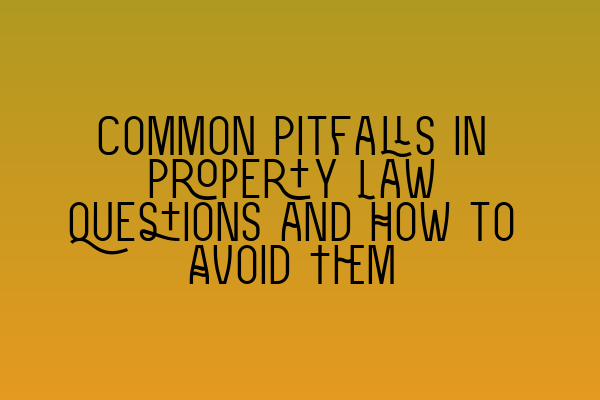Common Pitfalls in Property Law Questions and How to Avoid Them
Property law is a vast and complex area of the law that requires careful attention to detail and a deep understanding of legal principles. However, even the most seasoned property law practitioners can fall into common pitfalls when it comes to answering property law questions. In this blog post, we will discuss some of these pitfalls and provide tips on how to avoid them, ultimately improving your chances of success in property law exams and practical applications.
1. Failing to Read and Analyze the Question Carefully
One of the most common pitfalls in property law questions is failing to read and analyze the question carefully. Property law questions often contain intricate details and require a thorough understanding of the facts presented. By rushing through the question or overlooking important information, you risk missing key elements that are crucial to formulating a comprehensive answer.
To avoid this mistake, take the time to read and reread the question carefully. Highlight important details and make notes about the specific legal issues at hand. Pay attention to any specific statutes, case law, or legal principles mentioned in the question, as this will help guide your answer and ensure you are addressing all relevant aspects.
2. Neglecting to Identify the Relevant Legal Principles
Another pitfall in property law questions is neglecting to identify and apply the relevant legal principles. Property law is governed by a wide range of statutes and common law rules, including laws related to ownership, transfer, and use of property. It is essential to demonstrate a clear understanding of these legal principles and apply them correctly to the given scenario.
To avoid this pitfall, take the time to review and refresh your knowledge of the fundamental legal principles in property law. Familiarize yourself with key cases and statutes that are commonly tested in property law exams. Regular practice using SQE 1 Practice Exam Questions and SQE 1 Practice Mocks FLK1 FLK2 can help you identify any gaps in your understanding and solidify your grasp of the relevant legal principles.
3. Providing Incomplete or Inaccurate Definitions
In property law, precise definitions are crucial. Failing to provide accurate and complete definitions of legal terms is a common pitfall that can lead to a loss of marks in property law questions. Definitions serve as the foundation for your analysis and demonstrate your understanding of the legal concepts at play.
To avoid this pitfall, ensure that you provide clear and concise definitions of key legal terms whenever they are relevant to the question. Use your knowledge of property law to provide accurate definitions and explain their significance in the context of the question. Remember to use your legal research skills to support your definitions with authoritative sources, such as leading textbooks and relevant case law.
4. Ignoring Alternative Arguments and Counterarguments
Property law questions often involve complex scenarios that may have multiple potential outcomes or interpretations. Failing to consider alternative arguments or counterarguments can limit your analysis and result in a one-sided or incomplete response.
To avoid this pitfall, be open-minded and consider multiple perspectives when formulating your answer. Think critically about the different parties’ interests and how they may be affected by the legal principles at play. Address any potential counterarguments and provide reasoned explanations for why your preferred interpretation or conclusion is the most legally sound.
5. Neglecting to Apply the Law to the Facts
Lastly, failing to apply the law to the facts of the scenario is a common pitfall in property law questions. Property law is an applied area of the law, and it is essential to demonstrate your ability to analyze the given facts and apply the relevant legal principles to reach a well-reasoned conclusion.
To avoid this pitfall, take the time to carefully consider and analyze the facts provided in the question. Identify the elements that align with the applicable legal principles and explain how they interact with one another. Use the facts as a roadmap to guide your analysis and articulate your reasoning clearly and logically.
In conclusion, property law questions present unique challenges that require careful attention to detail and a comprehensive understanding of legal principles. By avoiding common pitfalls such as failing to read the question carefully, neglecting to identify relevant legal principles, providing incomplete definitions, ignoring alternative arguments, and neglecting to apply the law to the facts, you can enhance your performance in property law exams and practical applications. Be sure to take advantage of SQE 1 Preparation Courses and SQE 2 Preparation Courses to further improve your understanding and success in property law.
Remember, proper preparation and practice are key to achieving success in property law. Stay focused, review regularly, and seek guidance when needed. Good luck with your property law studies and future endeavors!
For more information about SQE exams, preparation courses, and exam dates, visit our related articles:
– SQE 1 Practice Exam Questions: https://fqps.co.uk/sqe/sqe1-preparation/mcq-practice-quiz
– SQE 1 Practice Mocks FLK1 FLK2: https://fqps.co.uk/sqe/sqe1-preparation/practice-mocks-quiz
– SQE 2 Preparation Courses: https://fqps.co.uk/sqe/sqe2-preparation
– SQE 1 Preparation Courses: https://fqps.co.uk/sqe/sqe1-preparation
– SRA SQE Exam Dates: https://fqps.co.uk/sqe/sqe1-sqe2-exam-dates
